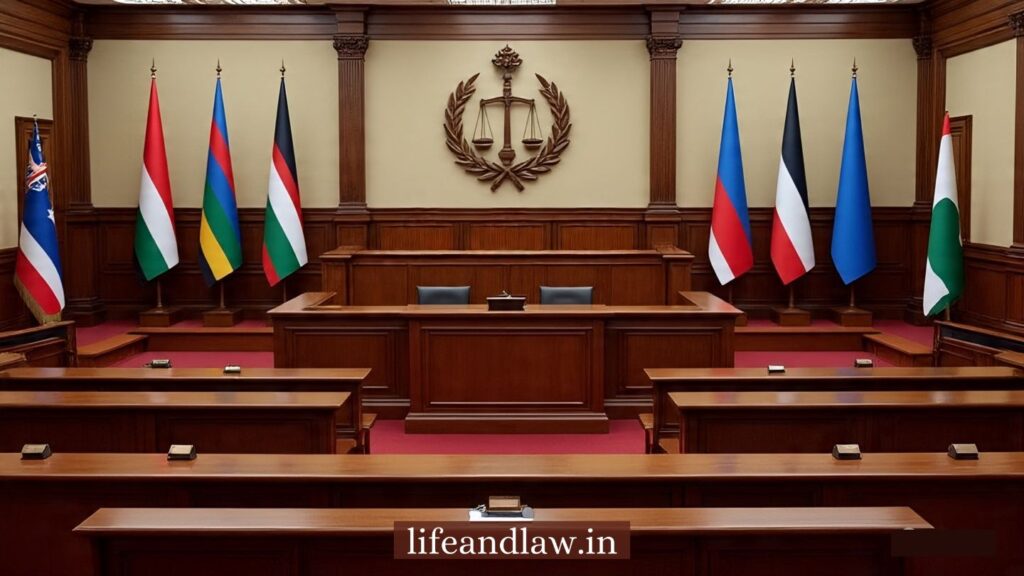
Every year on July 17, the world celebrates the World Day for International Justice, which commemorates the adoption of the Rome Statute—the treaty that established the International Criminal Court. This day serves as a reminder that justice is a universal human right that transcends boundaries and promotes fairness, accountability, and the rule of law across nations.
In today’s networked society, youth are no longer passive viewers, but active defenders and architects of justice. This article seeks to investigate how young people engage with international law, express their legal rights, and effect significant change within global justice systems, ultimately forging a future in which justice genuinely transcends boundaries.
International justice refers to the legal processes intended to hold individuals and states accountable for offenses that cross national borders, such as war crimes, genocide, crimes against humanity, and acts of aggression. The International Criminal Court (ICC), situated in The Hague, is an important organization in this field, working under the Rome Statute. Alongside it is the International Court of Justice (ICJ), which settles legal disputes between states.
These institutions are based on the principles of international law of equality before the law, the protection of human dignity, and the advancement of peace and security. However, for international justice to be genuinely effective, it must be inclusive, allowing future generations to participate in legal solutions.
Youth, defined by the United Nations as those aged 15 to 24, are protected by many international legal frameworks, most notably the UN Convention on the Rights of the Child (UNCRC). This treaty, which has been adopted by practically every country, emphasizes that children and young people have the right to free expression, protection from abuse, and access to justice.
Additionally, protocols to the UNCRC cover children in armed conflict, child trafficking, and exploitation—issues that are closely related to international criminal law. Customary international law requires nations to protect kids during violence and displacement, particularly considering their susceptibility in humanitarian situations.
However, protection is only one aspect of the situation. Youth must also take active roles in changing the structures that govern them.
Globally, young people are proven to be potential agents of legal and social change. Whether it’s Greta Thunberg petitioning the UN Committee on the Rights of the Child about climate inaction or Pakistani Nobel laureate Malala Yousafzai fighting for girls’ education, young people are increasingly using legal instruments to hold authorities accountable.
In numerous nations, youth-led climate litigation is forcing courts to acknowledge intergenerational justice, which holds that present generations have legal responsibility to protect the environment for future generations. These cases frequently use international environmental agreements and constitutional rights, demonstrating youth activists’ comprehensive awareness of legal systems.
Despite their commitment, many young people continue to encounter structural impediments to legal participation. Many jurisdictions have age limitations that prevent people from voting, running for office, or participating in formal legal proceedings. Legal education is frequently inaccessible, and civic literacy remains low in underserved areas.
However, efforts to close this gap are increasing. Programs such as Youth Parliaments, model UN conferences, and international moot courts provide young people with an opportunity to comprehend and mimic international legal proceedings. Digital tools are also democratizing legal knowledge, allowing young people to investigate, advocate, and mobilize across boundaries.
Legal empowerment—through knowledge, mentorship, and access to resources—is crucial for ensuring that youth are not only recipients of justice, but also co-creators.
The expression “Justice Without Borders” captures the developing character of international law. Climate change, cybercrime, and terrorism are examples of contemporary legal concerns that transcend national borders. Thus, legal answers must be collaborative, international, and inclusive.
Principles such as universal jurisdiction enable states to prosecute individuals for major international crimes regardless of where they happened. Extradition treaties, mutual legal aid agreements, and regional courts (such as the European Court of Human Rights) all highlight how justice can and should cross boundaries.
In the future, youth are not bystanders. They are global citizens with legal knowledge, civic obligation, and a desire for justice.
On this World Day for International Justice, we are reminded that the search for justice extends well beyond courtrooms and legal professionals. It exists in everyday settings—classrooms, online forums, local communities, and social media—where young people actively question injustice and demand accountability. Their voices, when empowered by legal knowledge and civic participation, are helping to rebuild global justice systems from the ground up.
This idea is championed by Adv. Abdul Mulla, creator of www.asmlegalservices and www.lifeandlaw.in, platforms committed to raising legal awareness and empowering youth through easily available legal information. His work emphasizes the critical need to empower young changemakers as guardians of international law and architects of a more just, borderless world.
Adv. Abdul Mulla (Mob. No. 937 007 2022) is a seasoned legal professional with over 18 years of experience in advocacy, specializing in diverse areas of law, including Real Estate and Property Law, Matrimonial and Divorce Matters, Litigation and Dispute Resolution, and Will and Succession Planning. read more….
Copyright BlazeThemes. 2025